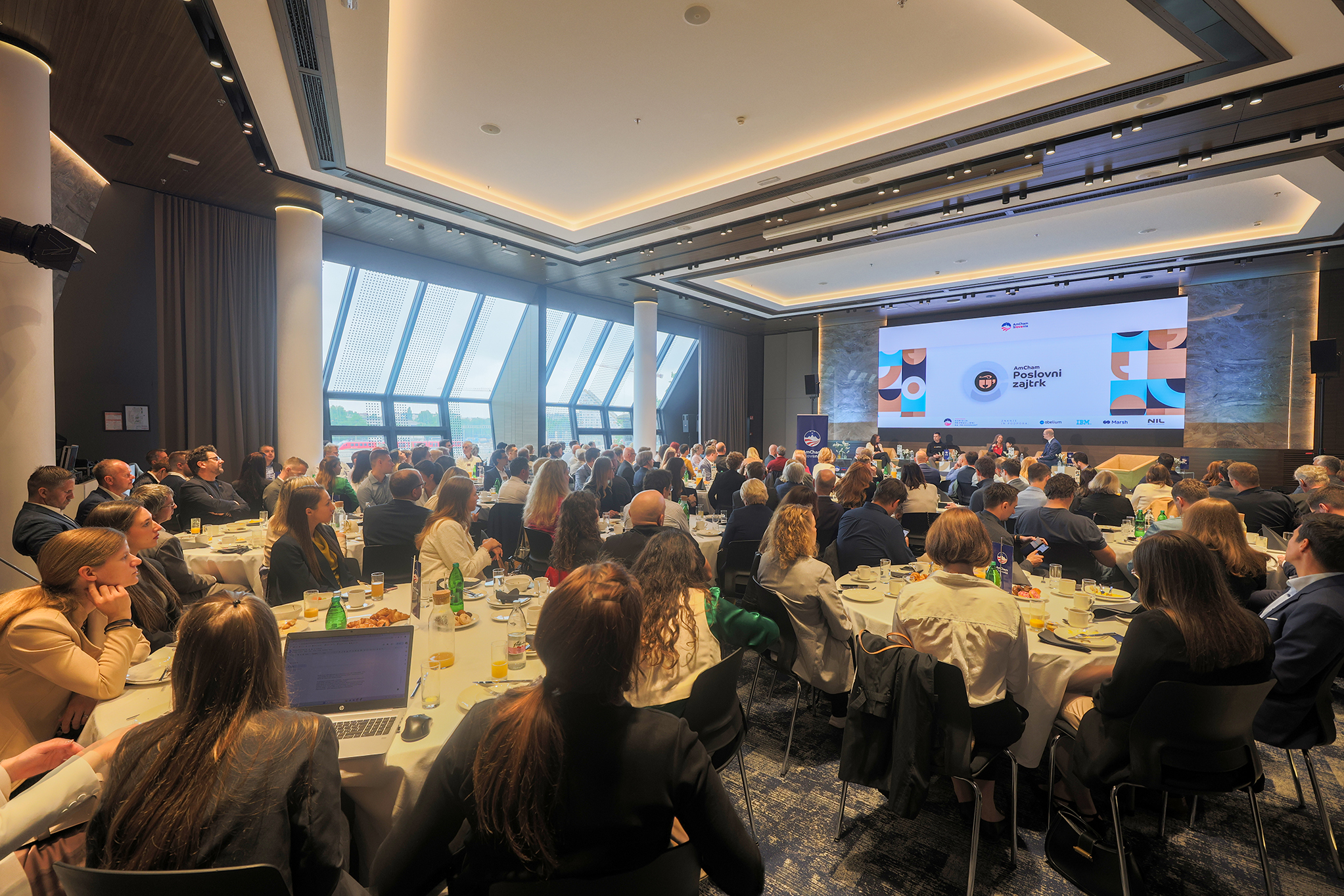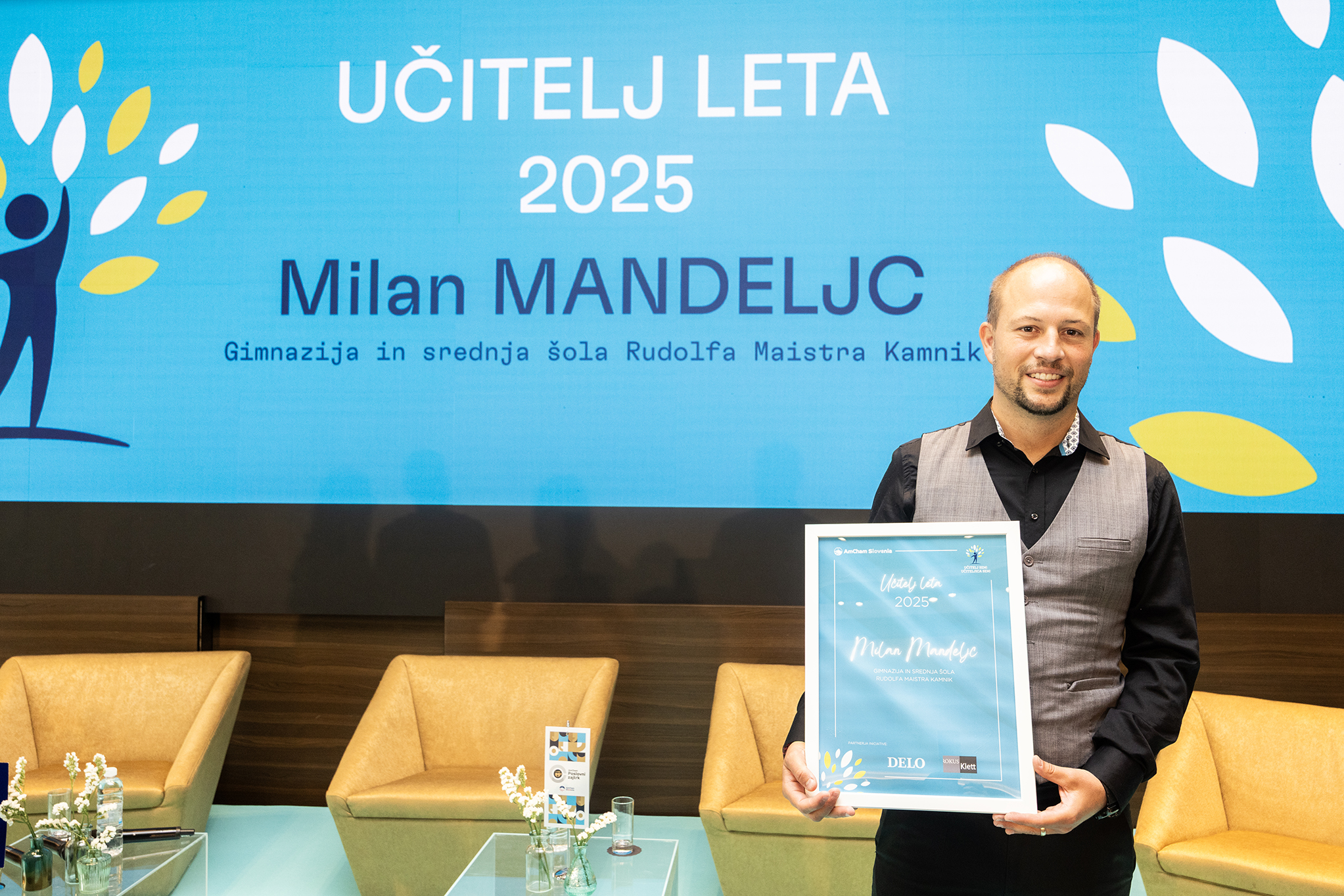Milan Mandeljc is an English teacher who proves that with dedication, a teacher can become an influential figure even on the international stage. He is the co-author of national competitions, the creator of English-language musicals, a speaker at international conferences, and recognized as one of the 16 best English teachers in the world. Through his work, energy, and approach, he pushes the boundaries of teaching and opens the door to modern forms of learning and creativity. His message is clear:
“With good teachers, we can change the world—especially the world of young people’s values.”
Future-Ready Competencies in Education
Andrej P. Škraba, a pioneer in digital education in Slovenia and the Co-founder of Astra AI—an AI tutor already used by over 113,000 students—pointed out that the traditional education system no longer meets the needs of today’s learners: “If the formal system worked, we wouldn’t have such demand for extra tutoring. We are entering an era where education must adapt, and AI will change learning—not as a threat, but as a personal tutor that democratizes access to knowledge.”
Due to a teacher shortage and growing needs, AI will inevitably become a part of education. Škraba noted that unlike human tutors, AI requires more self-initiative and internal motivation—skills that in turn help young people take responsibility for their own learning.
Dr. Manja Klemenčič, one of the two Slovenians who has recently worked at Harvard University and a recognized higher education expert, emphasized: “Universities like Minerva—one of the world’s most innovative, operating as a network-based university without a fixed physical campus—show that by involving local companies in learning programs and collaborating with the business sector to co-create microcredential programs, we can prepare young people much more effectively for employment.”
Uroš Ocepek, PhD Teacher of the Year 2022, Global Teacher Prize ambassador, and event moderator, added: “Digital skills are the foundation that can transform us from a knowledge society to a society of creators and innovators.”
“A two-hour subject in 7th grade is not enough to build future competencies.”
On World Telecommunication and Information Society Day, May 17, Boris Horvat, PhD, co-chair of the AmCham Ready4Future Committee, shared his perspective. He pointed out that although the Government of the Republic of Slovenia has approved amendments to the Elementary School Act introducing a new mandatory subject, Informatics and Digital Technologies, in 7th grade starting in 2028, this is far from sufficient: “But to truly develop future competencies, introducing a two-hour subject in 7th grade is too little and too late.”
He called for a more comprehensive approach—starting with the integration of basic computer science and informatics from first grade, followed by a standalone subject beginning in 4th grade and continuing through the end of primary school. He also emphasized the need to invest in teacher training and the development of high-quality learning materials.
The 55+ Generation Is a Vital Part of the Future of Work
Matic Vošnjak, Partner and Director at Competo, in conversation with Mojka Mišič, Communications and Advocacy Director at AmCham Slovenia, emphasized the overlooked value of older employees: “Companies still don’t realize how much value experienced employees bring to teams. Understanding their work vitality remains a challenge.”
AmCham Slovenia has formed a special working group under its Future of Work and Education Committee, focusing on the challenges and opportunities of “A+ employees”—those aged 55 and above. With Slovenia set to become the fifth oldest country in the world by 2050, and with one in four employees already over 55, it’s time for action. Despite this, only 38% of older employees have participated in any training over the past three years.
The job market unconsciously discriminates against older workers, and companies fail to leverage their mentoring potential and stability. The working group aims to develop best practices for including older employees in digital transformation, raise awareness of stereotypes, and propose systemic improvements. Generational diversity can drive resilience, innovation, and better results—but only if we recognize and support it. According to the OECD, older workers are often equally or more productive, more loyal, and have equal learning potential as their younger peers. Also, multistage career paths are becoming the new norm—demanding updated HR strategies and more inclusive workplaces.
We All Share the Responsibility for a Digital Future
Blaž Ferenc, Senior Director of HR, Corporate Communications and Sustainability at A1 Slovenia, and A1 Hrvatska, highlighted the role of companies in developing digital competencies: “When the school system stalls, business can step in to fill the gap.” He presented Spletne brihte, a project through which A1 has equipped nearly 40,000 young people over three years with knowledge about safe and responsible internet use.
At A1 Slovenia, employees of all generations stay up to date with technology, and a culture of continuous learning is key: “We can’t teach them values—that’s the job of our school system. But we can teach them skills. Each employee must dedicate 40 hours per year to learning—ideally, at least a quarter of that focused on future-ready skills. Everyone creates a personalized career plan, aligned with their interests, potential, and the challenges they foresee for themselves,” Ferenc explained.
The Future Will Be Shaped Not Only by Algorithms and Platforms—But by Trust and Understanding
Kristijan Musek Lešnik, Ph.D., Lecturer and Head of the Center for Positive Psychology at the Faculty of Mathematics, Natural Sciences and Technology, University of Primorskareminded us that we can’t expect everything from the school system: “It’s a system that moves slowly. The real question is not what it should give us—but how we can support excellent teachers.” He also emphasized the importance of psychologically safe environments in organizations: “We have a deep-rooted fear-of-mistakes culture. Often, we prefer to do nothing than risk doing something wrong. If we want change, we must create environments where it’s okay to say ‘I don’t know’ or ‘I need help.’”
Technological advances also raise serious ethical questions. Prof. Erik Štrumbelj, Ph.D., Professor at the Faculty of Computer and Information Science, University of Ljubljana, offered another perspective: “Technology may bring 10–20% productivity gains, but we must not lose the human element. AI can’t replace critical thinking—and that’s what we must nurture.”
The photo gallery is available HERE.

